SULAM UMPSA: Fostering A Civic Minded Graduates
Service learning is a well-known integrated approach to modern teaching and learning strategies. The history of service learning began with scholars like Ernest Boyer, who challenged American colleges to shift their focus beyond just preparing students for careers. In his view, education reform should be oriented towards producing citizens with a civic minded mentality who are capable of listening, caring, and contributing to the betterment of society.
Having lived in a world where challenges have risen and become complex, universities must be able to extend beyond their 'academic bubble' thus, they must be involved in societal changes and needs. As a response to these intricate and demanding challenges, the Ministry of Higher Education Malaysia has created a Service Learning Malaysia-University for Society (SULAM) in response to a few significant frameworks such as the Malaysian Education Blueprint 2019-2025 and High Impact Educational Practices. As SULAM is one of the key performance indicators for universities, its implementation requires the collective effort of all stakeholders as a reflection of commitment in producing socially responsible graduates.
SULAM is a relatively simple concept since it revolves around the implementation of service communities. However, there are a few distinctions in how one project can achieve a SULAM merit. The SULAM is not a 'touch and go' project like volunteerism or a 'drop and dash' project similar to a service community, but rather how students are actually transferring their knowledge to society and interacting with it. The society does not serve as a 'learning lab' where students can test their theoretical or practical knowledge, but rather as an environment where students and the community are involved in a healthy, symbiotic relationship. As a credit-bearing course, SULAM is integral to a course or program where student effort contributes to academic credit. The principles of SULAM include addressing social problems, providing at least 20 hours of student learning time (SLT), integrating reflection into the learning process, and evaluating the performance through a carefully crafted assessment based on the Course Learning Outcome (CLO).
Univwrsiti Malaysia Pahang Al-Sultan Abdullah (UMPSA) remains steadfast in its commitment to serving society, ensuring that the SULAM projects conducted thus far are both impactful and embody the spirit of 'Technology for Society'. Some of the projects that have been conducted come from the Centre for Human Sciences, under the courses UHE3412 Leadership in the World of Work (TVET) and UHE3242 Fiqh Haji and Umrah. The students in the leadership in the world of work course conducted a project in response to the report from the TVET Tracer Study in 2020, which indicated that 44.6% of them earning incomes below RM1000 from automotive repair and service workshops and 76.7% from tailoring and clothing manufacturing. In the course 'Fiqh Haji and Umrah', a key issue identified was the lack of practical opportunities for students to apply theoretical knowledge, a concern frequently raised by teachers.
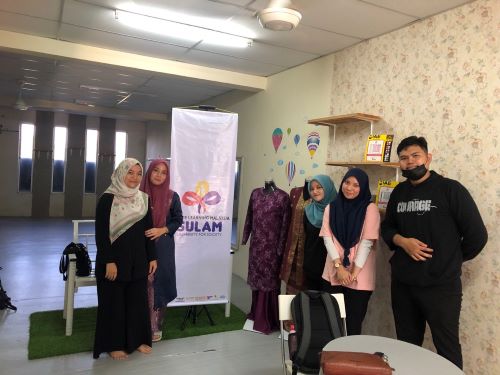
By directly engaging with these business owners (car repair and services and tailoring), students gain firsthand insights into the hurdles of TVET self employment, such as financial management and customer relations. Simultaneously, they offer valuable advice and strategies to help these entrepreneurs develop self-leadership skills, ultimately fostering a more resilient and adaptive business environment - Project by Centre for Human Sciences.
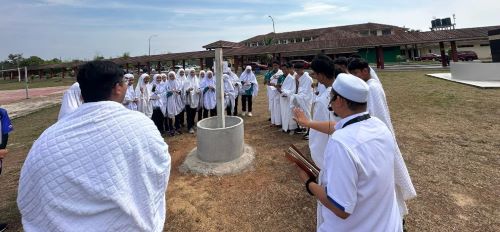
In the context of fiqh hajj and umrah, mini 'Pillars of Jamrat' was developed as a project that incorporates practical components that help students engage with real-world application - Project by Centre for Human Sciences.
As part of the faculty's commitment to community engagement, several other service learning projects have been conducted, addressing issues ranging from technical challenges to everyday concerns. UMPSA's initiatives are consistent with its nature as a member of the Malaysian Technical University Network (MTUN), which is focused on leveraging technical expertise to benefit society.
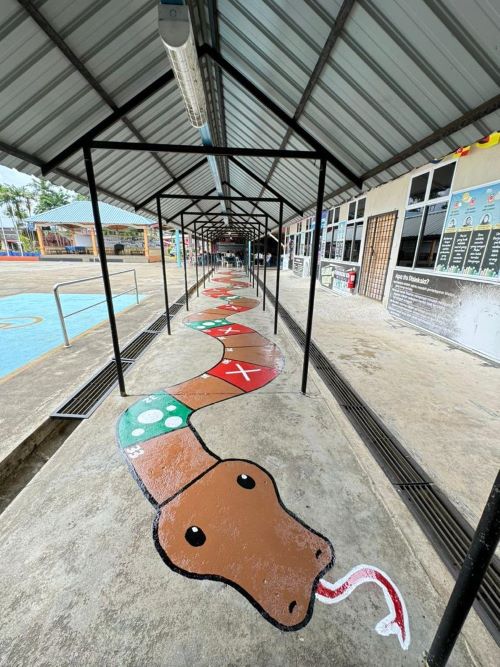
As a result of the declining performance in PISA and the trend for fewer students choosing STEM streams, the Centre for Mathematical Science has initiated a project called 'indoor game life size' under Talent Development (UHQ1012) - Project by Centre for Mathematical Sciences.
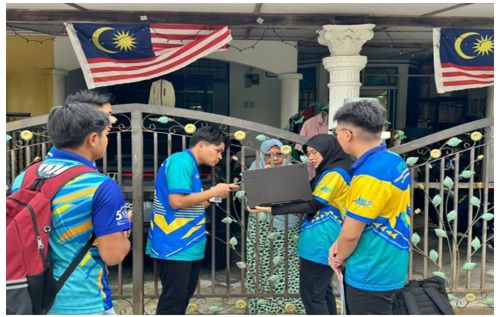
Electrical Fundamentals (BTE1213) has taken the initiative to conduct a project entitled 'Celik & Cekap Penggunaan Tenaga Elektrik' to raise awareness of energy consumption and its impact on utility bills among residents - Project by Faculty of Electrical and Electronics Engineering Technology.
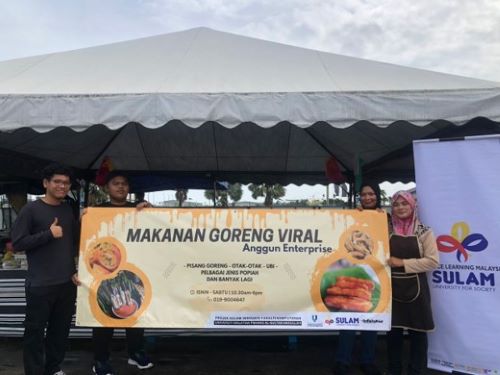
In another project undertaken by students in Fundamental of Digital Media Design (BCM2023), they designed the shop banner for a community of small vendors near Pekan, Pahang. It is concerning that, despite offering good food at affordable prices, there is no signage to effectively showcase the available menu items - Project by Faculty of Computing.
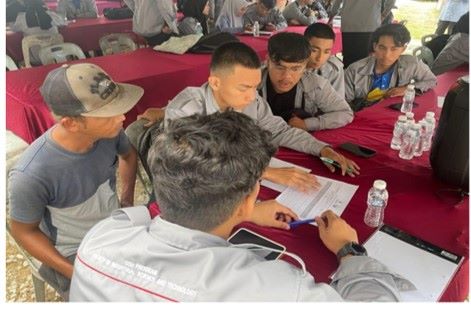
Students Hazard Recognition and Risk Management (BPS1143 ) provided training to industrial workers on foundational knowledge and awareness of safe work culture. – Project by Faculty of Industrial Sciences and Technology.
UMPSA is steadily gaining a momentum to incorporate SULAM in their 46 programs as instructed by MOHE, aiming to enhance students' engagement with communities and apply academic learning in real-world contexts. This integration emphasizes experiential learning, where students contribute to societal well-being while developing essential skills aligned with their academic goals. By embedding SULAM across various programs, the university not only complies with MOHE’s directive but also fosters a culture of civic responsibility and practical learning. As a result, students gain valuable experiences that bridge theoretical knowledge with community impact, reinforcing the university’s commitment to producing well-rounded graduates ready to contribute meaningfully to society.
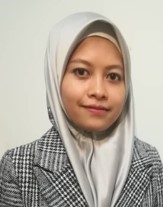
The writer is a Senior Lecturer and SULAM Coordinator at the Centre for Human Sciences, Universiti Malaysia Pahang Al-Sultan Abdullah (UMPSA).
This is the personal opinion of the writer or publication and does not necessarily represent the views of UMPSA.
E-mail : hadijah@umpsa.edu.my
- 243 views










